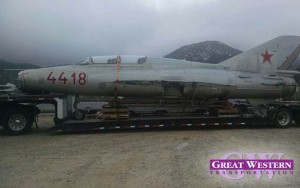Transporting heavy machinery is a difficult task in the best of conditions, but, winter brings a whole other set of complications to the table. Extreme cold temperatures, ice, snow and salt all wreak havoc on the process, making it more difficult to load, unload and transport equipment safely. Roadways are often slippery, or drifted over with snow, meaning drivers must be extra diligent and safety conscious. What’s more, these cold weather conditions also increase the potential for injury from a slip and fall accident.
Battling the Elements
When the temperature drops, metals become brittle, oil thickens and equipment has a tougher time running properly. This applies to securement devices as well. It’s imperative that every chain, strap and connection be free of ice and snow in order to perform properly. Removal of excess snow and ice from the equipment, trailer, and undercarriage is essential to minimize weight and maximize maneuverability. Salt and other ice melting materials, if left for long periods, will deteriorate the metal components of safety equipment and the trailer itself. Therefore, it’s vital that it is thoroughly removed at regular intervals during the season.

Winter Driving Safety
Heavy equipment is just that, heavy. The weight, combined with slippery roadways is cause for concern for every truck driver. To combat the potential for accidents, drivers must be extremely focused and prepare in advance to slow down for traffic, stop, and take turns and curves. Driving too fast for conditions is a recipe for disaster. It’s also of paramount importance that excess snow is removed from the trailer and cargo to avoid causing a hazard for other motorists. When a truck is moving at highway speeds with snow blowing off, drivers behind the truck are visually impaired, making it more treacherous for everyone.
Slip and Fall Hazards
In the majority of cases, heavy equipment is transported on the back of a flatbed trailer because of its size and weight. While this is the most convenient and effective means, it’s not without risks, especially in the winter months. Drivers and others involved with the process of loading and unloading equipment must be extremely careful when moving around the trailer. A slip and fall accident will result in injuries that have long-lasting effects. It’s vital that loading is undertaken with several individuals available to assist, and that proper safety equipment is used. Perhaps the most important safety tip, however, is to take it slow and easy and consider each move before it’s made.
Just because the weather is getting colder, doesn’t mean that construction projects aren’t being completed. The reality is, the job has to be done, no matter what obstacles are presented. It all begins with safely moving the heavy equipment to the job site. That means paying close attention to the weather conditions, taking precautions while driving to mitigate slippery conditions and working in a safe manner while loading and unloading.





